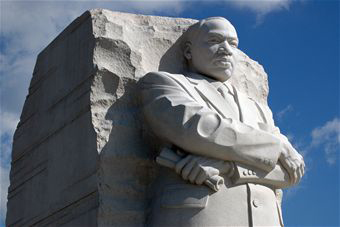Commentary by Dr. Adis Vila
Chief Diversity Officer
United States Air Force Academy
As a people and as a nation, we have come a long way since the civil rights movement of the early 1960s. King would be proud. But at the same time, we have not yet achieved the point he devoted his life to help our society reach.
One of the most significant speeches in our nation’s history was the “I Have a Dream” speech, which King delivered Aug. 28, 1963. During this speech, King expressed hope for a world where men and women would be “judged not on the color of their skin, but by the content of their character.”
He also highlighted urgency to equal treatment and equal opportunity when he said, “It would be fatal for the nation to overlook the urgency of the moment. … 1963 is not an end, but a beginning. Those who hope that the Negro needed to blow off steam and will now be content will have a rude awakening if the nation returns to business as usual.”
Later in that same speech, King added: “The marvelous new militancy which has engulfed the Negro community must not lead us to a distrust of all white people, for many of our white brothers, as evidenced by their presence here today, have come to realize that their destiny is tied up with our destiny.”
Many of you may not be aware that white Americans played a significant role in supporting King. Clarence Jones, King’s attorney, confidant and friend, wrote that nearly 25 percent of the people present at the march were white in “Behind the Dream: The Making of the Speech that Transformed a Nation.”
“Throughout the ’60s, I spent a lot of time in the living rooms of many white families who were eager to offer both their time and financial support to the cause. One of Dr. King’s most important intellectual contributions to the civil rights movement was his thesis that as long as African-Americans represented only 10 to12 percent of the population, we could not hope to change the country unless we convinced a significant portion of the majority that it was in their self-interest to help us do so,” Jones wrote.

Retired Army Gen. Colin Powell said he believes he and many others benefited profoundly from “less discrimination, a truer merit system and a leveler playing field” in the military. The Army, he said, is what enabled him to “love my country, with all of its flaws, and to serve her with all my heart.” Powell served for more than 35 years, retiring as chairman of the Joint Chiefs of Staff and later serving under President George W. Bush as secretary of state.
In a commencement address at Howard University delivered May 14, 1994, Powell said, “As the world goes forward, we cannot start going backwards. African Americans have come too far and we have too far yet to go to take a detour into the swamp of hatred. … Our future lies in the philosophy of love and understanding and caring and building, not of hating and tearing down. We know that — each and every one of us knows that to the depth of our heart, and we must be prepared to stand up for it and speak up for it.”
Powell has been a strong believer in the concept that in diversity there is strength for our military and for our nation. In that same commencement address, he implored the graduates to never lose faith in America.
“America’s faults are yours to fix, not to curse. America is a family: There may be differences and disputes within the family, but we must not allow the family to be broken into warring factions. From the diversity of our people, let us draw strength and not seek weakness.”
During a speech delivered at the National Constitution Center in Philadelphia on March 18, 2008, then-presidential candidate Barack Obama said, “… Working together, we can move beyond some of our old racial wounds. And that in fact we have no choice — we have no choice if we are to continue on the path of a more perfect union.”
As you can see, there are many accomplished African-Americans in law, business, the military and politics, but we can’t afford to sit back and assume that others will carry on King’s legacy. I challenge you to ACT:
- Affirm our commitment to King’s dream, which, as pointed out by Clarence Jones, was “an American dream, not just an African-American dream.”
- Commit to going beyond structural diversity, important as it is. Think about and act in a way that ensures that diversity of thought takes hold in our workplaces and in our homes. Allow for different points of view; celebrate the differences that those with whom you live and work represent.
- Together join forces to lead. While it is true that King, the civil rights movement and many others committed to equality have dismantled segregation and institutional racism, much remains to be done. Diversity begins with each of us.
Today, many more African-Americans are in executive roles in the private sector, in senior positions in the government and military. These leaders are committed to racial equality and inclusion; yet, there may never be a moral leader of the stature of Dr. Martin Luther King Jr. It is up to each of us, in our own small ways, to step in where we see the undercurrents of racism. Where we see divisiveness and rancor, set an example, and ACT in a way that would make King proud.
Be the leader that can point to a better tomorrow. Change can happen. Change begins with each of us.






